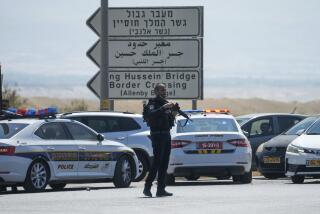Israel Secures Roads Against Snipers and Chides Settlers
- Share via
JERUSALEM — With passions and violence flaring anew in the occupied West Bank, Israel’s government took steps Sunday to secure highways from the danger of Arab snipers and warned settlers not to mount vengeance attacks on Palestinians.
After the shooting deaths of three motoring settlers in the last two months and a subsequent outcry, the military authorities on the West Bank forbade Palestinians from walking along the roadside after dark. The move is supposed to reduce chances that gunmen will ambush vehicles on the roads.
“We have declared what you can call a curfew on the roadsides,” said Gen. Danny Yatom, the military commander of the West Bank.
Yatom also warned settlers against vigilantism. Twice in the past week, settlers rampaged through the town of Ramallah, smashing windows and hurling stones. The settlers were reacting to the fatal shooting of Zvi Klein, a settler who was hit in an ambush on Dec. 1 as he drove through El Bireh, a town adjacent to Ramallah.
The latest vandalism occurred overnight Sunday and resulted in eight arrests. “We will not stand aside and let unlawful activities occur,” Yatom said.
He told reporters that the use of guns by Palestinians is increasing, although he said the numbers of gunmen are “not vast.” He said six Israelis were killed in the West Bank this year. Yatom linked the shootings to opposition among radical groups to the peace talks now under way in Washington.
In the last two days, shots were fired at a civilian car near Beit Furik as well as at Maalot Amos. No one was hurt in either ambush. An unexploded hand grenade was found inside the walls of Jerusalem’s Old City. Yatom, who took up his post four months ago, asserted that a spate of attempted bombings of the police station in Bethlehem is meant to discourage Christmas celebrations in the city, which have been subdued for the last four years because of the Arab uprising. “We expect a concerted attempt to hit Israeli targets,” he said.
Palestinian leaders have also been predicting increased violence by opponents of the peace talks. They advise that a lack of progress--and so far, there has been nothing but debate on arcane points of procedure--will lead to more violence.
Settlers have become enraged by the shootings on the highways and charge that the army’s protection is insufficient. On Saturday night, a group from the militant Kiryat Arba settlement decided to activate vigilante patrols and to pursue Arab gunmen themselves.
Self-defense units are reportedly in place in Ariel, one of the largest West Bank settlements, and other communities. Settlers routinely carry weapons with them when they travel, and last week a settler leader from the southern West Bank announced that he had fired on schoolchildren who tried to pelt him with stones. No one was injured.
Besides the window-smashing in Ramallah, settlers uprooted olive trees near the scene of the second shooting. On Sunday, leftist peace groups planted saplings to replace the trees, but a settler group pulled them up again.
“The situation is not getting out of hand,” Defense Minister Moshe Arens told a radio reporter. “We’re going to do everything possible to see the situation does not get out of hand.”
Gen. Yatom characterized vigilante raids as something “that doesn’t help.”
“I hope,” he added, “that it does not become a problem.”
The effort to keep gunmen off the roadsides was tried in Lebanon during Israel’s occupation and withdrawal after the 1982 invasion. It didn’t work, and Israel’s troops were often harassed by sniping.
Despite the army’s warnings about a surge of live gunfire, not all of its efforts appear to be concentrated on the armed Palestinian threat. Last week, soldiers shot an unarmed 29-year-old Palestinian near Janin because he made a “suspicious movement.” The same rationale was given for the fatal shooting of a youth in Jerusalem last month.
The army meanwhile lifted a two-week curfew on Ramallah and El Bireh which they had imposed after the Klein shooting.
More to Read
Sign up for Essential California
The most important California stories and recommendations in your inbox every morning.
You may occasionally receive promotional content from the Los Angeles Times.










